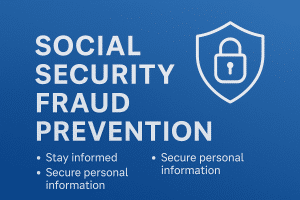Social Security fraud prevention measures: what you need to know
Social Security fraud prevention measures include staying informed, securing personal information, reporting suspicious activity, and understanding the legal consequences of fraud to protect benefits and ensure the integrity of the system.
When it comes to protecting your benefits, Social Security fraud prevention measures are crucial. Have you ever wondered how fraud can impact your finances? In this article, we’ll explore effective strategies to keep your Social Security safe.
Understanding Social Security fraud
Understanding Social Security fraud is crucial for safeguarding your benefits. Fraud can take many forms, and recognizing them is the first step in prevention. By being aware of how fraud occurs, you can better protect yourself and your loved ones.
Common Types of Social Security Fraud
There are several ways that Social Security fraud can happen. Here are some of the most common types:
- Identity theft: This occurs when someone uses your personal information to apply for benefits in your name.
- Misrepresentation: Some people may knowingly provide false information to qualify for benefits, such as underreporting their income.
- False claims: Filing a claim for benefits that you are not entitled to can lead to serious legal consequences.
Being alert to these types of fraud can protect your benefits. Another way to safeguard your Social Security is by staying informed about recent scams and fraud tactics that target recipients.
Fraudulent schemes can sometimes be sophisticated, involving fake websites or phone calls from individuals posing as government officials. You might receive emails asking for your personal details; remember, the Social Security Administration will never ask for sensitive information via email. Always verify the source before providing any information.
Protecting Yourself
How can you protect yourself from Social Security fraud? Here are some effective measures:
- Monitor your accounts: Regularly check your Social Security statements to ensure all information is accurate.
- Use secure passwords: Make sure your online accounts, especially those related to Social Security, are protected with strong and unique passwords.
- Report suspicious activities: If you notice anything unusual regarding your benefits, report it immediately to the Social Security Administration.
By following these steps, you can help prevent fraud and protect your vital benefits. The more you know and stay vigilant, the safer your Social Security benefits will be.
Common types of Social Security fraud

There are several common types of Social Security fraud that individuals should be aware of to protect their benefits. Recognizing these fraudulent activities can help prevent financial loss and ensure a secure future.
Identity Theft
One of the most serious forms of fraud is identity theft. This occurs when someone steals your personal information to apply for benefits or services in your name. Criminals may use your Social Security number, earning or employment history to create false profiles.
Misrepresentation of Information
Another common fraud type involves misrepresenting crucial information. This can include providing false data regarding income, medical conditions, or marital status to qualify for Social Security benefits that a person would otherwise not be eligible to receive.
False Claims for Benefits
Individuals sometimes submit false claims, where they fabricate circumstances that would allow them to collect benefits. This could mean inventing an illness or exaggerating a disability. Consequences can include legal repercussions and repayment demands from the Social Security Administration.
Working While Claiming Benefits
Some recipients do not report income earned while claiming benefits. If you earn above a certain threshold while on disability benefits, you can lose your eligibility. This is an important factor to consider when deciding to return to work.
- Monitor your earnings closely.
- Report any changes in income to the Social Security Administration.
- Be cautious when sharing your personal information.
These types of fraud can have serious implications for your benefits. Staying informed and vigilant is key in avoiding potential pitfalls.
Preventive steps to avoid fraud
Taking preventive steps to avoid fraud is essential in protecting your Social Security benefits. By being proactive, you can minimize the risk of falling victim to fraud schemes. Here are some effective strategies to consider.
Stay Informed
Knowledge is power. One of the best ways to avoid fraud is to stay updated on the latest scams and fraudulent activities. Follow trusted news sources or official websites related to Social Security to keep yourself informed.
Secure Your Personal Information
Always safeguard your personal information. Be careful about what you share online and with whom. Ensure that sensitive documents are stored securely, and be cautious when discussing your Social Security number. A good practice is to shred documents containing personal information rather than just throwing them away.
- Be aware of unsolicited phone calls asking for personal details.
- Never share your Social Security number unless absolutely necessary.
- Use strong passwords for online accounts related to Social Security.
Regularly monitoring your Social Security statements can also help you detect any unauthorized activity. If you notice anything unusual, report it immediately. Taking a close look at your Social Security Statement at least once a year can help you catch potential discrepancies early.
Utilize Two-Factor Authentication
Another layer of protection is two-factor authentication. This is available on various online platforms, including Social Security accounts. Enabling this feature often requires a second form of verification, making it harder for fraudsters to gain access to your information.
Report Suspicious Activity
If you suspect fraud, report it as soon as possible. You can contact the Social Security Administration directly to report any concerns. Being diligent about reporting can help both you and others avoid future fraud incidents.
By implementing these preventive measures, you can help protect your benefits and ensure your Social Security remains secure.
Reporting suspected Social Security fraud

Reporting suspected Social Security fraud is an important step in protecting your benefits and the integrity of the Social Security system. If you suspect fraud, acting quickly can help prevent further issues.
Know What to Report
Understanding what constitutes fraud is key. This can include cases like identity theft, false claims for benefits, or misrepresentation of information. If you notice discrepancies in your Social Security statement or receive a notice about benefits that you did not apply for, it’s essential to take action.
Fraud can also manifest as someone collecting benefits while not qualifying for them. Knowing the signs can help you identify when to report suspicious activity.
How to Report Fraud
If you suspect fraud, you can report it directly to the Social Security Administration (SSA). You have several options for reporting:
- Call the SSA at their dedicated fraud hotline.
- Visit the SSA website to file a report online.
- Mail your report to the Social Security Administration’s Fraud Hotline address.
When reporting, provide as much detail as possible. This includes names, dates, and specific activities that seem suspicious. The more information you offer, the easier it will be for investigators to address the issue.
What Happens After Reporting
Once you file a report, the SSA will investigate the suspected fraud. They may contact you for further information or clarification. It’s crucial to stay engaged and cooperate with authorities during the investigation.
Remember, reporting fraud helps protect not only your benefits but also those of other individuals who rely on Social Security. Your vigilance is a critical part of combating fraud.
Consequences of Social Security fraud
The consequences of Social Security fraud can be severe and far-reaching, affecting not only the individual committing the fraud but also the integrity of the entire Social Security system. Understanding these consequences is crucial for everyone involved in or relying on the program.
Legal Repercussions
Individuals found guilty of committing fraud may face serious legal penalties. These penalties could include fines, repayment of benefits received, and even imprisonment. The Social Security Administration takes fraud cases seriously and works with law enforcement to prosecute offenders.
Loss of Benefits
Another significant consequence is the loss of benefits. If you are found to have committed fraud, not only will you lose any benefits you received fraudulently, but you could also lose your eligibility for future benefits. It is a risk that can affect your financial stability and quality of life.
Impact on Credit and Employment
Being convicted of fraud can have lasting impacts on your credit and employment opportunities. A criminal record can hinder your ability to find a job or secure loans in the future. Employers often conduct background checks, and a conviction may lead to disqualification from many job opportunities.
- Once fraud is detected, if you are employed, your employer may terminate your employment.
- Creditors may view a history of fraud as a risk factor in lending decisions.
- Future earnings opportunities may be severely limited based on a past fraud conviction.
Moreover, the community’s trust in the Social Security system can diminish. When fraud occurs, it raises concerns about the system’s effectiveness and the management of public funds. This erosion of trust can lead to stricter regulations and scrutiny for everyone, not just those committing fraud.
In conclusion, understanding and preventing Social Security fraud is crucial for everyone involved. By being informed about the various types of fraud, implementing preventive measures, and knowing how to report suspicious activities, you can help protect not only your benefits but also the integrity of the system. The consequences of fraud are significant and far-reaching, impacting individuals and public trust alike. Therefore, staying vigilant and proactive is essential for ensuring a secure future for all Social Security beneficiaries.
FAQ – Frequently Asked Questions about Social Security Fraud
What should I do if I suspect Social Security fraud?
If you suspect fraud, report it immediately to the Social Security Administration using their hotline or website.
What are the common types of Social Security fraud?
Common types include identity theft, false claims for benefits, and misrepresentation of information.
What are the consequences of committing Social Security fraud?
Consequences include legal penalties, loss of benefits, and negative impacts on your credit and employment opportunities.
How can I protect myself from Social Security fraud?
Stay informed, secure your personal information, regularly monitor your statements, and use two-factor authentication.





